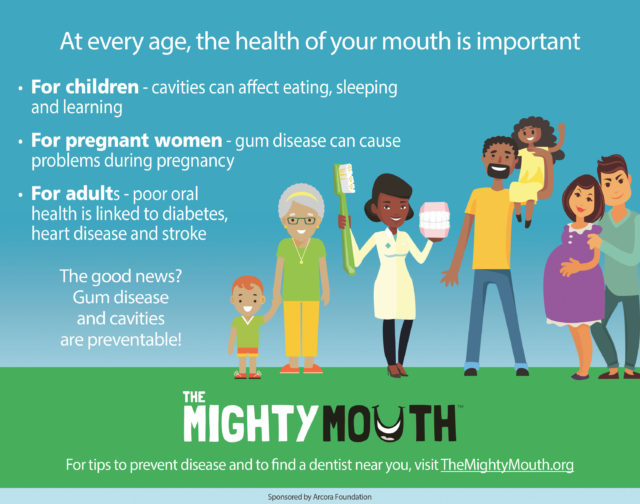By Fred Kiga, Board Chair of Arcora Foundation
For The North American Post
I admit as a child I didn’t brush and floss as often as I should have. Luckily for me, my parents understood the importance of oral health. They insisted I take the bus downtown twice a year to see our family dentist. This attention to oral health makes sense because good oral health can be life changing. People are healthier and have more opportunities with healthy mouths.
Unfortunately, too many children in our community are not getting the dental care they need to be healthy. When children have dental disease, they are not being set up for success. Severe cavities can make it difficult for children to eat, sleep, play, and learn. Poor oral health affects self-image and confidence. A child who doesn’t smile because of bad teeth may have difficulty making friends or speaking up in class.
Cavities can start with the very first tooth and spread quickly becoming difficult and expensive to treat. That’s why it is so important for every child to have their teeth screened by a dentist or physician by their first birthday. Cavities in baby teeth often lead to cavities in permanent teeth causing lifelong oral health problems.
As an adult, it is hard to find a job if you are missing teeth. It’s hard to keep a job if your cavities are the cause of chronic pain and missed work. Oral disease also is associated with an increased risk for heart disease, stroke and other serious medical conditions, including diabetes and pregnancy complications. And cavity-causing germs can be spread from mother to child. Which is why dental care during pregnancy is so important.
Disparities in quality of life have emerged as a central theme in local and national policy discussions. Well, some of the most problematic disparities exist in the realm of oral health.
For example, in our state 10 percent of white children have untreated preventable decay. That number is significantly higher for children who are Asian (16 percent), Hispanic (15 percent) black (18 percent), Native American (19 percent) or Pacific Islander (26 percent). Children of color and from lower-income households had higher rates of decay and were less likely to get care than their white and more affluent counterparts.
These health disparities need to be addressed. In our society a bright smile is a primary indicator of social status. Poor oral health and dental disease can negatively affect every aspect your life. Yet, companies continue to relentlessly market sugary foods and drinks to children, especially children of color. As a result of clever slogans and expensive ad campaigns, too many people mistakenly believe that juice or sports drinks really are healthy options. These drinks are not healthy, they are full of sugar and bad for your health.
As a community, we need to push back against this deceptive marketing. We should encourage our friends and families to drink water for thirst, not sugary drinks. If you are fortunate enough to have fluoride in your water, drink tap water. You are already paying for the water, there is no plastic involved and drinking water is so much better for your health, and your teeth.
We also need to insist that policymakers prioritize health equity by closing the oral health gap. Only 54 percent of lower-income children are getting dental care. We can and must do better. There are existing programs, such as Access to Baby and Child Dentistry (ABCD), to connect lower-income children to dental care. More needs to be done to make sure that ABCD reaches additional children. We need to prioritize prevention and early dental care because every child, from every community deserves to start life with a healthy mouth. As a community, we all benefit when people are healthy, and this must include good oral health.
For more tips on how to protect your oral health and to get connected with dental care, visit TheMightyMouth.org.
 Fred Kiga JD, MBA, is Board Chair of Arcora Foundation. He previously held executive positions with Vigor Industrial, Amazon and Boeing. Kiga also was the Director of the Washington State Department of Revenue before becoming Chief of Staff for Governor Gary Locke.
Fred Kiga JD, MBA, is Board Chair of Arcora Foundation. He previously held executive positions with Vigor Industrial, Amazon and Boeing. Kiga also was the Director of the Washington State Department of Revenue before becoming Chief of Staff for Governor Gary Locke.
Arcora Foundation is funded by nonprofit Delta Dental of Washington, the state’s largest dental benefits company, and is committed to partnering with communities to prevent disease and improve oral health. For more information, visit: www.ArcoraFoundation.org







